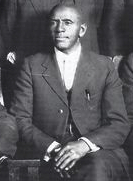
Photo info ...
Credit: Public domain via Wikimedia CommonsView Source
(ca. 1872-ca. Feb. 25, 1922). A transplanted North Carolinian, Taylor was a cofounder of baseball’s Negro National League (NNL). Raised by a Methodist minister, he played third base for Atlanta’s Clark College and served with the U.S. Army during the Spanish-American War. He then became the manager of the Negro League’s Birmingham Giants in 1904. His upbringing as the son of a Methodist minister influenced his managerial style, and many of the players whom he signed, like him, either attended college or served in the military.
Taylor moved the renamed Sprudels to West Baden, Indiana, in 1909. In 1914, white businessman Thomas Bowser lured him to Indianapolis to manage the , named in honor of the team’s sponsor, Indianapolis’ American Brewing Company (See ). Bowser recruited him because he was considered one of the top minds in Black baseball.
Taylor purchased a half-interest in the ABCs, and his reputation helped him gather top talent. In 1915, the ABCs added a star when 18-year-old Indianapolis native returned home. The 1916 ABCs included not only Charleston but also Bingo DeMoss, and Taylor’s brothers Ben, Johnny, and “Candy” Jim. That year the club defeated the legendary Rube Foster’s Chicago American Giants five games to four in the Negro World Series.
In 1919, Taylor, along with sportswriter Dave Wyatt, used the Black press to promote ideas for the creation of a formal league. On February 13, 1920, in Kansas City, Missouri, Foster and Taylor met with other Black baseball owner-managers to form the Negro National League. The ideas that Taylor and Wyatt had developed became the heart of its constitution. With Foster as president and Taylor as vice president, the NNL became the most successful Black baseball league. Wyatt eventually became secretary.
One of Black baseball’s premier field managers, Taylor was a strict but fair disciplinarian. He demanded discipline on and off the field and insisted that all ABCs players wear collars, ties, and shined shoes when not in uniform. The ABCs became role models for Black youth in Indianapolis. Supporting the (NAACP), Taylor believed that playing and behaving gentlemanly would make white society more inclined to recognize Black baseball’s merits. His wife Olivia became the first female president of the Indianapolis branch of the NAACP in 1925.
During the NNL’s first seasons, its schedules were unbalanced. NNL teams played unequal numbers of games, were unfairly matched, and did not share prime game dates. As a result, team profits were grossly uneven, and the ABCs struggled. In February 1922, Taylor attended the NNL’s winter meetings in Chicago to convince owners to continue and stay committed to their goals. He succeeded but fell seriously ill with pneumonia and died soon after his return to Indianapolis. At the time of his death, he was rumored to be worth nearly $10,000 (about $154,000 in 2020). Taylor’s funeral occurred at , and he is buried in .
After his death, Taylor’s wife became the owner and his brother Ben became the manager of the ABCs. The team went into decline, and it folded in Indianapolis halfway through the 1926 season. What was left of the franchise moved to Cleveland, Ohio, where the team became the Cleveland Hornets. The NNL circuit survived until the Great Depression destroyed its economic viability in 1932.

Help improve this entry
Contribute information, offer corrections, suggest images.
You can also recommend new entries related to this topic.